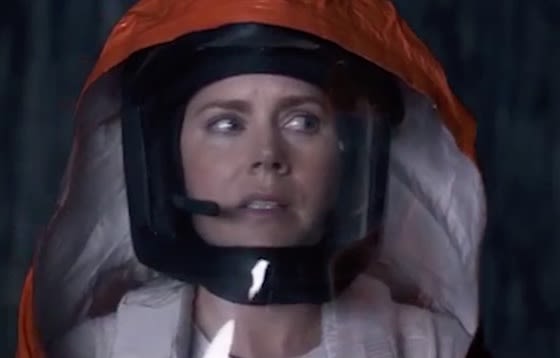It's still a relatively new tradition, but prestige space pictures are becoming an autumn staple as ubiquitous as pumpkin spice lattes (and complaining about pumpkin spice lattes).
The trend's endurance is strange, given that none of these sci-fi event movies have been all that good. From hippy-dippy philosophy bros (Interstellar) to endlessly wisecracking A-listers (Gravity, The Martian), these films have been riddled with issues. Fortunately, the ever-reliable Denis Villeneuve is here to save the budding subgenre with his excellent Arrival.
Rather than blast the A-listers into space here, space comes to them via multiple enormous, egg-shaped UFOs that hover over various spots around the globe, including Montana.
The invasion first happens while linguistics expert Dr. Louise Burns (played with masterfully and with arresting subtlety by Amy Adams) is teaching a university course. Naturally, no one wants to sit through class when there are aliens landing on earth.
As he attempts to decode some sounds from the aliens on board, Colonel Weber (Forest Whittaker) approaches Adams and asks her to translate an audio recording. Since she needs to see the aliens in order to correctly interpret their language, however, she's instead flown to a base camp alongside cocky scientist Ian Donnelly (Jeremy Renner, who is good at being cocky).
The aliens are octopus-like buddies, not unlike The Simpsons' Kang and Kodos (though they're nicknamed Abbott and Costello in the film). After some trial and error, Louise eventually gets them to start communicating through strange circular symbols (many of which will surely wind up tattooed on some diehards' arms). With the entire world watching, Louise is forced to determine whether or not the aliens are delivering a message of peace or a doomsday-threatening war cry.
There are some minor quibbles to be had with the film. Some may find the film's payoff a little too schmaltzy, in part thanks to Max Richter's fantastic but ludicrously overplayed violin suite "On the Nature of Daylight." The piece is distracting for anyone who will recognize it, and many will — after all, it appeared in Shutter Island, Stranger Than Fiction, The Face of an Angel and other flicks. It's as overplayed in movies as "The Nutcracker Theme" or Spoon's "The Way We Get By," and its appearance is particularly annoying for taking away from Jóhann Jóhannson's marvellously brash original score.
That's a small complaint for what is ultimately a satisfying work. Arrival delivers white-knuckle suspense while exploring themes of loss, humanity and destiny. We can finally celebrate the arrival of an intergalactic, intellectual flick that's actually good. (Sony)
The trend's endurance is strange, given that none of these sci-fi event movies have been all that good. From hippy-dippy philosophy bros (Interstellar) to endlessly wisecracking A-listers (Gravity, The Martian), these films have been riddled with issues. Fortunately, the ever-reliable Denis Villeneuve is here to save the budding subgenre with his excellent Arrival.
Rather than blast the A-listers into space here, space comes to them via multiple enormous, egg-shaped UFOs that hover over various spots around the globe, including Montana.
The invasion first happens while linguistics expert Dr. Louise Burns (played with masterfully and with arresting subtlety by Amy Adams) is teaching a university course. Naturally, no one wants to sit through class when there are aliens landing on earth.
As he attempts to decode some sounds from the aliens on board, Colonel Weber (Forest Whittaker) approaches Adams and asks her to translate an audio recording. Since she needs to see the aliens in order to correctly interpret their language, however, she's instead flown to a base camp alongside cocky scientist Ian Donnelly (Jeremy Renner, who is good at being cocky).
The aliens are octopus-like buddies, not unlike The Simpsons' Kang and Kodos (though they're nicknamed Abbott and Costello in the film). After some trial and error, Louise eventually gets them to start communicating through strange circular symbols (many of which will surely wind up tattooed on some diehards' arms). With the entire world watching, Louise is forced to determine whether or not the aliens are delivering a message of peace or a doomsday-threatening war cry.
There are some minor quibbles to be had with the film. Some may find the film's payoff a little too schmaltzy, in part thanks to Max Richter's fantastic but ludicrously overplayed violin suite "On the Nature of Daylight." The piece is distracting for anyone who will recognize it, and many will — after all, it appeared in Shutter Island, Stranger Than Fiction, The Face of an Angel and other flicks. It's as overplayed in movies as "The Nutcracker Theme" or Spoon's "The Way We Get By," and its appearance is particularly annoying for taking away from Jóhann Jóhannson's marvellously brash original score.
That's a small complaint for what is ultimately a satisfying work. Arrival delivers white-knuckle suspense while exploring themes of loss, humanity and destiny. We can finally celebrate the arrival of an intergalactic, intellectual flick that's actually good. (Sony)
